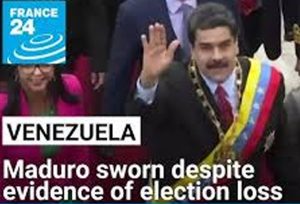
Five men — allegedly perpetrators of an attack on four U.S. citizens last week that killed two — appeared tied up on a Matamoros street yesterday, with an apology note claiming to be from the armed with of the Cartel del Golfo. “We’ve decided to hand over those involved and directly responsible in the events who acted at all times under their own free will.” (Animal Político)
It was not clear whether the message was accurate or actually written by the cartel. (New York Times, Washington Post)
The case has caused outrage in Mexico, where angry observers note the effective government response that rapidly located the U.S. citizens, in a country where more than 100,000 people are missing and crimes are rarely solved. (New York Times, Guardian, see yesterday’s briefs)
The kidnapping and killings have also led some U.S. Republican politicians to call for U.S. military intervention against Mexican cartels — a proposal Mexican President Andrés Manuel López Obrador rejected as a threat to national sovereignty. (See yesterday’s briefs.)
AMLO also sought to distance Mexico from the U.S. fentanyl crisis, saying his country does not produce the substance, which is responsible for the majority of U.S. drug overdose deaths. U.S. law enforcement officials have said fentanyl is mass-produced by Mexican drug cartels and then distributed by American criminal networks. (Washington Post)

Nicaragua
- “Journalism done from exile remains as the last reserve of all of our constitutional freedoms” Nicaraguan journalist Carlos F. Chamorro said in an Oxford University Lecture, “How to report under a dictatorship: lessons from Nicaragua and beyond”. (Confidencial)
Regional
- OAS Secretary General Luis Almagro made almost three dozen work trips with a female staffer with whom he maintained a long-running intimate relationship, reports the Associated Press. An external probe is looking into whether Almagro’s romance with the Mexican staffer two decades his junior violated the Washington-based group’s ethics code.
- Cocaine seizure figures from Latin America last year “suggest traffickers are varying their routes to avoid detection, as authorities get a better grip on spotting trafficking through maritime container ports,” reports InSight Crime.
- In a region where voters are increasingly angry at political elites and afflicted by violence, the apparent success of Salvadoran President Nayib Bukele’s mano dura policies against street gangs (and sky-high approval ratings) are attracting significant attention. El Salvador’s unique circumstances make the model difficult to implement elsewhere. And questions about the sustainability of the government’s “punitive populism,” its actual success, and — of course — the significant human rights cost should give pause to copycats in the region, I argue in Le Monde Diplomatique.
Argentina
- The Argentine city of Rosario, where a series of attacks have drawn national attention to perennial criminal organization violence, is one of the places in Latin America where politicians are talking about the “Bukele Model”. (Le Monde Diplomatique)
- This week President Alberto Fernández said he’d increase the number of federal security forces available in the region for the combatting of drug-trafficking and violence, and would deploy the Army’s engineering company in the area for public works in informal neighborhoods. (El País, Buenos Aires Times)
- An Argentine federal court released a 1,600-page ruling outlining the grounds on which it sentenced Vice President Cristina Fernández de Kirchner to six years in prison in the ‘Vialidad’ public works graft case. (Buenos Aires Times)
- The sentence theoretically blocks her from holding public office, but only if confirmed by the Supreme Court, which means it won’t technically impact this year’s elections. Kirchner has said she will not run for office again, but many of her followers consider the case a proscription move. (El País)
- Argentina is wasting the opportunities China offers it, according to the Economist.
Migration
- Discussions about Caribbean migration often focus on emigration to the Global North. But intraregional migration is an important trend that has grown across the region for decades, according to a new Migration Policy Institute report.
- The shoddy U.S. Customs app, required for migrants to apply for asylum, inadvertently benefits criminals and the tech-savvy, reports Rest of World. “The app has made an already grueling journey even more of an ordeal. Migrants spend their scarce time and money optimizing their phones, changing their usual migration routes, and avoiding new forms of digital extortion that have emerged due to criminals exploiting CBP One’s glitches.”
Brazil
- Brazil’s operations against wildcat gold miners in Yanomami territory are only a stop-gap measure. Recently passed legislation “has begun the process of tightening Brazil’s gold trade, adding an additional layer of security against the laundering of illegally-sourced precious metals,” reports InSight Crime.
Chile
- A year into Gabriel Boric’s presidency in Chile, his government has struggled between ideals and pragmatism. A cabinet shuffle expected today will be telling of Boric’s balance moving forward, argues Robert Funk in Americas Quarterly.
- Chilean lawmaker’s dismissal of a key government tax reform proposal this week was a hard blow for the Boric administration. It is indicative of a polarized legislative process, Finance Minister Mario Marcel told El País. He said he was surprised by the “weakening of the willingness to parliamentary dialogue and the desire to inflict a blow on the government for various reasons.” (See yesterday’s post.)
Guyana
- “Guyana finds itself in a paradoxical historical position, having discovered immense reserves of the world’s primary source of energy at precisely the moment when global consensus is shifting away from further investments in dirty fuels,” reports the Dial.
Jamaica
- Fifteen people have been convicted on charges ranging from gang membership and gun possession to murder. The year-long, landmark trial is a major win for Prime Minister Andrew Holness’ government, and was hailed by Jamaican authorities as a major blow to one of the island’s deadliest criminal organizations, reports the Guardian.
Peru
- Peru’s crisis is “worth studying closely by democracies everywhere; it shows just how bad democratic decay can get when politics is contaminated by a dangerous authoritarian ideology,” writes José Carlos Agüero in the Washington Post. “And it shows the determination a people can muster when things have gone too far.”
Guatemala
- Guatemalan presidential candidate Zury Ríos proposes a “new story,” but her closest advisors are a hodgepodge of old faces from the country’s political establishment, including lawyers for her father, dictator Efrain Ríos Montt, and allies of former President Álvaro Arzú. (No Ficción)
Cayman Islands
- The Cayman Islands has quietly become the main conduit through which Chinese companies raise money by selling shares to foreigners, according to a team of researchers from Stanford, Columbia and Yale. (New York Times)
Colombia
- The Petro administration’s “Total Peace” initiative in Colombia will not pardon drug traffickers or release them from prison under proposed surrender deals. Instead, the government wants to offer “more benign penal treatment” in exchange for “a voluntary dismantling of armed structures,” Justice Minister Néstor Iván Osuna told Reuters.
- Pirate Wire Services accompanies a field mission conducted by Medicos Sin Fronteras that provides medical attention to communities and regions that are directly controlled by battling criminal armed groups.
- The Diada in Colombia uses algorithms to help identify people with or at risk of developing a mental health or alcohol use disorder — filling a significant gap in the health systems ability to detect these issues, reports the Guardian.
Bolivia
- Bolivians lined up outside La Paz’s central bank headquarters this week in a rush to convert their savings into dollars amid growing fears over the bank’s dwindling cash reserves, reports Bloomberg. (See Latin America Risk Report.)
Jordana Timerman/Latin America Daily Briefing












